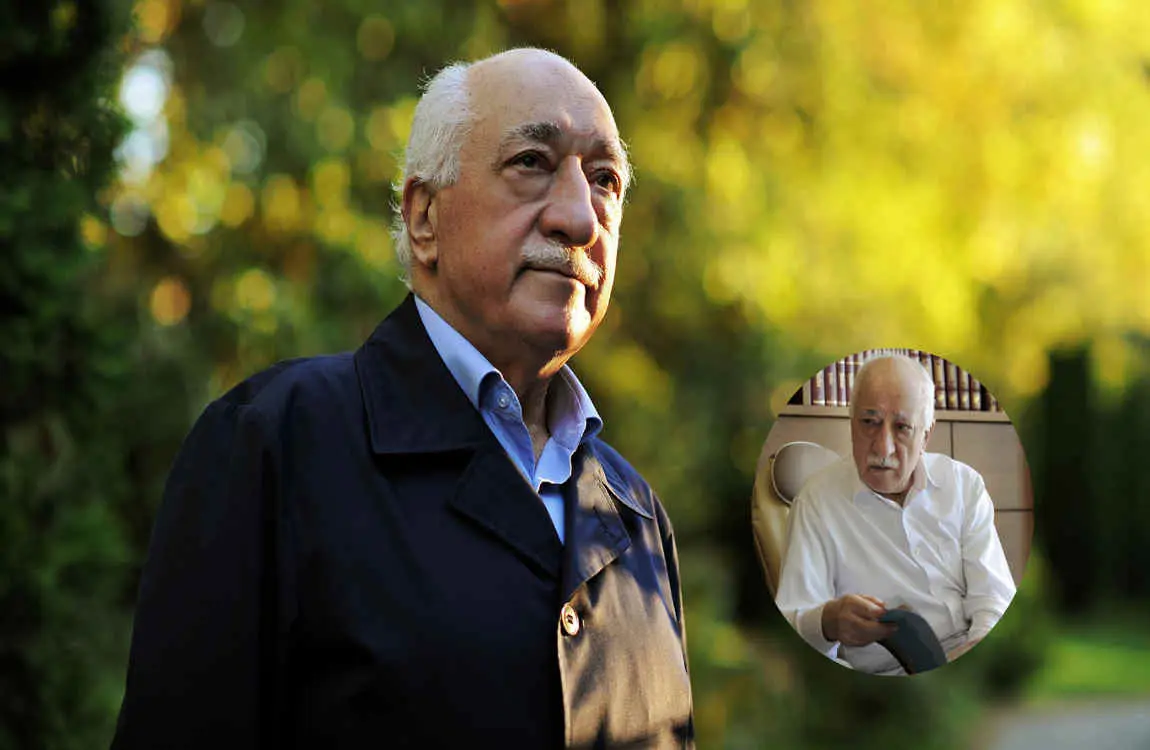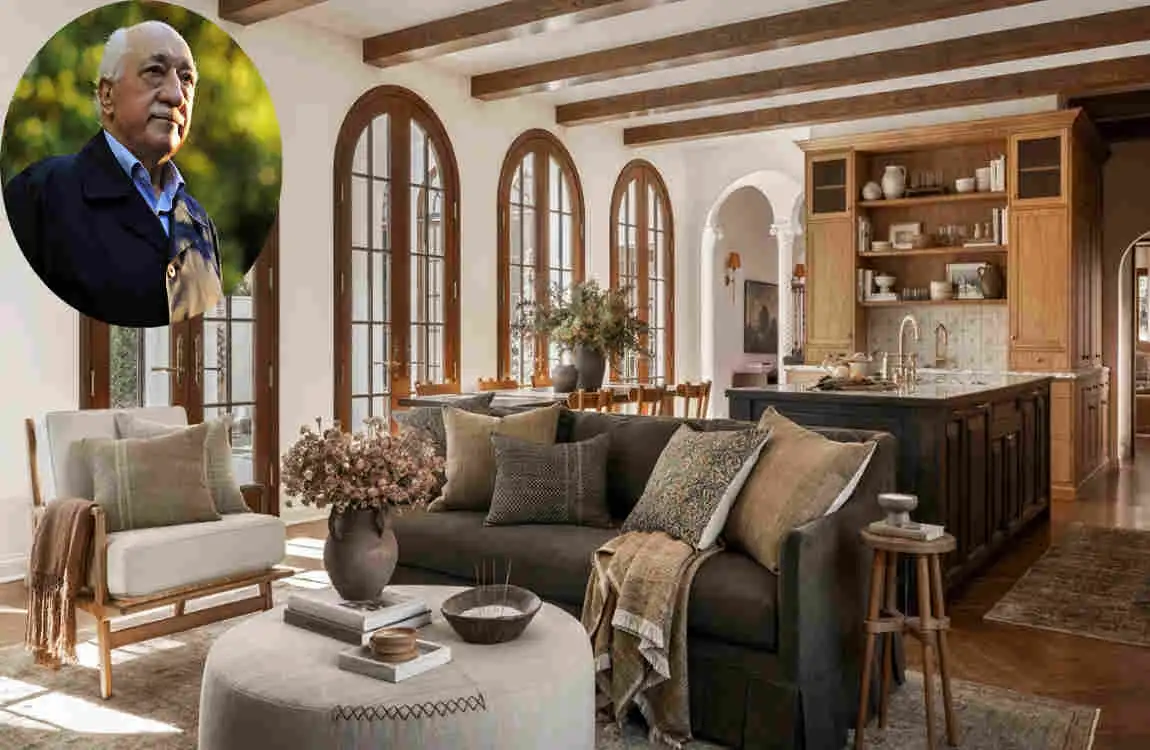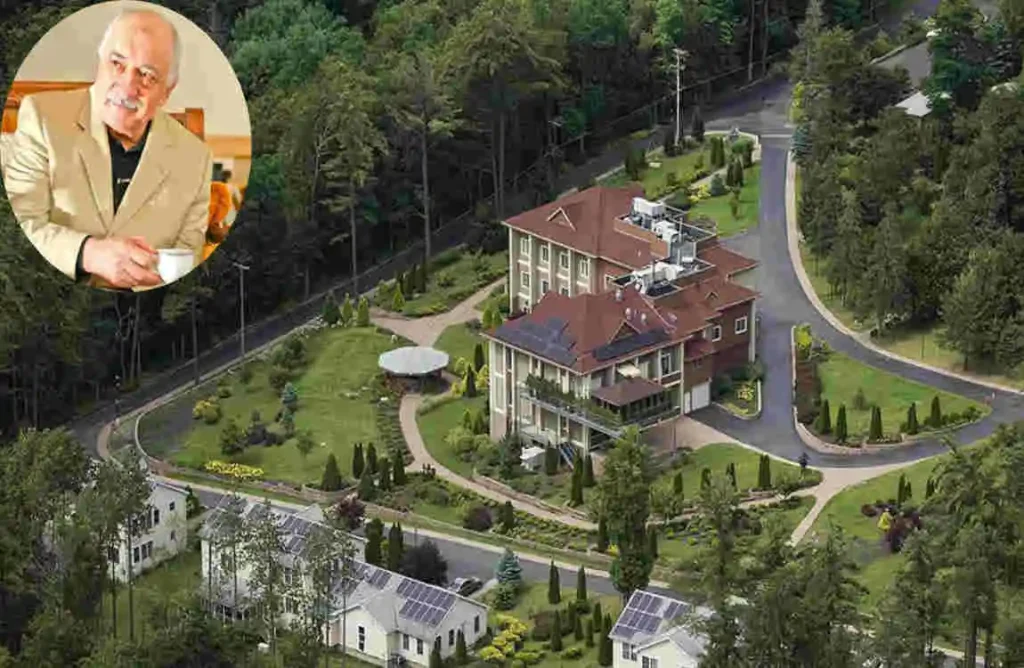Have you ever wondered what the home of a renowned spiritual leader and intellectual looks like? Today, we’re taking an intimate look at Fethullah Gülen’s house – a residence that’s far more than just four walls and a roof. This isn’t your typical celebrity home tour. Instead, we’re diving deep into a space that embodies philosophy, spirituality, and decades of intellectual pursuit.
Fethullah Gülen, the Turkish Islamic scholar and preacher, has called his Pennsylvania residence home for over two decades. But what makes this particular dwelling so fascinating? Is it the architecture? The spiritual atmosphere? Or the countless intellectual discussions that have taken place within its walls.
| Information | Details |
|---|---|
| Full Name | Muhammed Fethullah Gülen |
| Date of Birth | April 27, 1941 |
| Place of Birth | Korucuk, near Erzurum, Turkey |
| Occupation | Turkish Muslim scholar, preacher, author, educator, and political dissident |
| Movement | Leader of the Gülen movement |
| Known for | Islamic scholar with a moderate Sunni/Hanafi perspective, social activist, and educator |
| Current Status | Passed away on October 20, 2024 |
| Place of Residence | Lived in self-imposed exile near Saylorsburg, Pennsylvania, USA before passing away |
| Notable Details | Lived on a secured compound in Pennsylvania’s Pocono Mountains in the United States |
| Net Worth | Specific net worth details are not publicly available |
Background of Fethullah Gülen and His Residence

Before we can truly appreciate the significance of Fethullah Gülen’s house, let’s first understand the man who calls it home. Born in 1941 in Erzurum, Turkey, Gülen emerged as one of the most influential Islamic scholars of our time. His teachings emphasize interfaith dialogue, education, and peaceful coexistence – values that would later shape every aspect of his living space.
The Fethullah Gülen house location sits nestled in the Pocono Mountains of Pennsylvania, specifically in Saylorsburg. This rural setting wasn’t chosen by accident. When Gülen moved to the United States in 1999, ostensibly for medical treatment, he sought a place that offered both privacy and proximity to nature. The choice reflects his preference for contemplation over ostentation.
The property itself spans several acres of pristine woodland. Unlike what you might expect from someone of his influence, the Fethullah Gülen residency is remarkably modest. The main building blends seamlessly with its natural surroundings, almost as if it grew from the earth itself. This harmony between structure and nature isn’t coincidental – it’s a deliberate choice that speaks volumes about Gulen’s philosophy.
What prompted this move to Pennsylvania? The late 1990s were turbulent times in Turkey. Political pressures and health concerns led Gülen to seek refuge in the United States. What was meant to be a temporary stay evolved into a permanent residence. Over the years, this house has transformed from a simple dwelling into a significant landmark for his followers worldwide.
The estate includes not just the main residence but also auxiliary buildings used for various purposes. Guest houses accommodate visitors, while meeting spaces facilitate the intellectual exchanges that have become synonymous with Gülen’s work. Every structure on the property serves a purpose beyond mere functionality – they’re designed to foster community, learning, and spiritual growth.
Architectural Features of the Fethullah Gülen House
Design Philosophy and Style
You may also read (jim caviezels house).
| Aspect | Description |
|---|---|
| Location | Saylorsburg, Pennsylvania, United States |
| Property Size | 26-acre compound |
| Number of Buildings | Around 10 buildings including the main house and mosque hall |
| House Design | Modern three-story house |
| Living Quarters | Small apartment atop the main house with modest furnishings |
| Surroundings | Bucolic farmland and woods, oak and cedar trees |
| Ownership | Golden Generation Foundation |
| Notable Features | Mosque hall, tranquil and quiet environment |
| Estimated Value | Not publicly known |
| History | Gulen moved there in 1999 ahead of charges in Turkey; lived there in self-exile until his death |
Step inside the Fethullah Gülen house architecture, and you’ll immediately notice something striking – the absence of ostentation. The design philosophy here isn’t about impressing visitors with grandeur. Instead, it’s about creating spaces that nurture the soul and stimulate the mind.
The architectural Style blends traditional Turkish elements with practical American construction. You’ll find arched doorways reminiscent of Ottoman architecture alongside modern amenities. This fusion isn’t just aesthetic – it represents Gulen’s vision of bridging East and West, tradition and modernity.
Unique Design Elements
What truly sets the unique design of Fethullah Gülen’s house apart are the thoughtful details scattered throughout. Natural light floods every room through strategically placed windows. These aren’t just for illumination – they frame views of the surrounding forest, bringing nature indoors. The effect is both calming and inspiring.
The materials used tell their own story. Local stone and wood dominate the construction, grounding the building in its Pennsylvania setting. Yet Turkish tiles and calligraphy add cultural touches that remind visitors of Gulen’s heritage. This material dialogue creates a unique atmosphere you won’t find in typical American homes.
Interior Spaces and Layout
The Fethullah Gülen home features prioritize function over form, yet achieves a remarkable elegance. The library stands as the heart of the house – a two-story space filled with thousands of books in multiple languages. Natural wood shelving reaches toward a skylight that bathes readers in gentle illumination. It’s here that Gulen spends most of his time, surrounded by the written wisdom of centuries.
Meeting rooms flow naturally from one to another, designed to accommodate groups of varying sizes. The furniture is simple yet comfortable – nothing that would distract from meaningful conversation. Persian rugs add warmth and color, while cushioned seating areas invite lengthy discussions.
Sustainable and Eco-Friendly Features
Environmental consciousness permeates the property. Solar panels supplement traditional power sources. A sophisticated water recycling system reflects Islamic principles about resource conservation. Even the landscaping follows sustainable practices, with native plants that require minimal maintenance.
The kitchen deserves special mention. It’s designed to prepare meals for large groups efficiently, reflecting the importance of hospitality in Turkish culture. Yet it maintains the same understated elegance found throughout the house. Modern appliances hide behind wooden facades that match the overall aesthetic.
Comparison with Regional Architecture
When you compare this residence to typical houses in the Pocono region, the differences become apparent. While neighboring properties might showcase wealth through size and ornamentation, the Fethullah Gülen house demonstrates a different kind of richness. It’s wealthy in purpose, in meaning, in the quality of human interactions it facilitates.
Spiritual and Intellectual Significance of the House

More Than Just a Residence
To understand the spiritual significance of Fethullah Gülen’s house, you must look beyond its physical structure. This isn’t merely a place where someone sleeps and eats. It’s a living, breathing center of spiritual practice and intellectual exchange. Every morning begins with prayer in a dedicated space facing Mecca. The prayer room, simple yet profound, sets the tone for each day.
Visitors often describe an almost palpable sense of peace upon entering the grounds. Is it the natural setting? The thoughtful design? Or something more intangible? Many believe it’s the accumulated effect of decades of prayer, study, and meaningful conversation. The walls seem to have absorbed the wisdom shared within them.
An Intellectual Hub
The intellectual hub of Fethullah Gülen’s house has become perhaps its most remarkable feature. Scholars, religious leaders, and thinkers from around the world make pilgrimages here. They come not for the building itself, but for what happens inside it. The house facilitates a unique kind of dialogue – one that transcends religious and cultural boundaries.
Weekly gatherings bring together diverse groups for discussions on everything from theology to science, education to current affairs. The format is informal yet structured. Participants sit in circles, ensuring everyone can see and hear each other. There’s no podium, no stage – equals sharing ideas.
Symbolism in Every Corner
Walk through the house, and you’ll notice symbolic elements everywhere. Calligraphy adorns walls with verses from the Quran and sayings of Rumi. Water features create soothing sounds that aid meditation. Even the color schemes – earth tones with splashes of blue and green – connect occupants to nature and divinity.
The garden holds special significance. It’s not just decorative but functional, providing vegetables and herbs for the kitchen. This self-sufficiency reflects Islamic teachings about living simply and sharing with others. Surplus produce goes to local food banks, extending the house’s influence beyond its walls.
Impact on Visitors
Testimonies from visitors reveal the profound impact of experiencing the Fethullah Gülen house teachings firsthand. A university professor from Japan described how a single afternoon there changed his understanding of Islam. A Christian minister spoke of finding common ground he never expected. These aren’t isolated incidents – they’re typical of what happens when people gather in this unique space.
The house serves as a living classroom. Unlike traditional educational settings, learning here happens organically. A casual conversation over tea might evolve into a deep philosophical discussion. A walk in the garden could spark insights about the interconnectedness of all creation. The environment itself becomes a teacher.
The House as a Reflection of Gülen’s Philosophy
Embodying Core Principles
Every aspect of the Fethullah Gülen house philosophy reflects the man’s core beliefs. Take hospitality, for instance. In Turkish culture, guests are considered blessings. The house design facilitates this principle with multiple guest rooms, spacious common areas, and a kitchen capable of feeding dozens. No visitor leaves hungry – physically or spiritually.
Simplicity stands out as another key principle. Despite Gülen’s global influence, his personal quarters remain modest. A simple bed, a desk for writing, shelves of books – that’s essentially it. This isn’t poverty but a conscious choice. Material possessions beyond the necessary are seen as distractions from spiritual growth.
Humility in Design
The symbolism in Fethullah Gülen’s house extends to its very foundations. Built into a hillside rather than atop it, the structure demonstrates humility. It doesn’t dominate the landscape but works with it. This architectural choice mirrors Gulen’s teaching that humans should be stewards of nature, not its masters.
Even the entrance makes a statement. There’s no grand foyer or impressive doorway. Visitors enter through a modest door into a simple hallway. The message is clear: all are equal here. Status and wealth mean nothing. What matters is the sincerity of one’s heart and the openness of one’s mind.
Promoting Dialogue and Education
The Fethullah Gülen house, an inspiration for dialogue, manifests in the physical layout. Rooms flow into each other, encouraging movement and interaction. There are no isolated spaces where people might retreat into their own thoughts exclusively. Even the library, while quiet, has seating arranged to facilitate discussion.
Educational philosophy permeates the environment. Books line not just the library but hallways and common rooms too. They’re in Turkish, English, Arabic, and numerous other languages. The message? Knowledge has no linguistic or cultural boundaries. Truth can be found in many sources.
Living the Teachings
What makes this house truly house unique is how it serves as a three-dimensional manifestation of Gulen’s teachings. The principle of hizmet (service) appears in the volunteer-maintained gardens. The concept of dialogue lives in the circular seating arrangements. The value of knowledge breathes through the extensive library.
Followers often comment that spending time in the house helps them understand Gulen’s teachings in ways books alone cannot. It’s one thing to read about living simply – it’s another to see it practiced daily. The house doesn’t just shelter a philosophy; it embodies it.
Public Perception and Media Portrayal of Fethullah Gülen’s Residence
A House Divided by Opinion
The public perception of Fethullah Gülen’s house varies dramatically depending on whom you ask. To supporters, it’s a beacon of peace and wisdom. Critics see it differently, viewing it as the headquarters of a secretive organization. The truth, as often happens, lies somewhere in between these extremes.
Media coverage has been equally divided. Some journalists describe a serene retreat where interfaith dialogue flourishes. Others paint a picture of a mysterious compound shrouded in secrecy. These contrasting narratives reflect broader divisions about Gülen himself and his movement.
Myths and Realities
Several myths about Fethullah Gülen’s house persist in public discourse. Some claim it’s a luxurious mansion funded by wealthy followers. The reality? While comfortable, the house is far from opulent. Others suggest it’s completely closed to outsiders. In fact, genuine scholars and religious leaders are often welcomed.
The security measures at the property have also generated speculation. Yes, there is security – but this reflects genuine safety concerns rather than secretiveness. Public figures, especially controversial ones, require protection. The level of security is actually modest compared to similar figures’ residences.
Recent Media Attention
The Fethullah Gülen house’s media coverage intensified following political developments in Turkey. Journalists from major international outlets have visited, each bringing their own perspective. Some focus on the political angles, others on the religious aspects. Few capture the full complexity of what the house represents.
Documentary filmmakers have also shown interest. Their footage reveals a place quite different from public imagination – neither the paradise supporters claim nor the sinister hideout critics suggest. It’s simply a house where an elderly scholar lives, studies, and receives visitors. The ordinary nature of daily life there surprises many viewers.
Visiting or Exploring the Fethullah Gülen House
Access and Restrictions
Many people wonder about visiting Fethullah Gülen’s house. The reality is that it’s not a public tourist attraction. This is, first and foremost, a private residence. However, legitimate researchers, religious leaders, and educators can sometimes arrange visits through proper channels. The process requires patience and a genuine academic or interfaith interest.
Security protocols are understandably strict. All visitors must be vetted in advance. Photography is limited to protect privacy. These measures might seem excessive to some, but they’re necessary given the political sensitivities involved. The goal is to maintain a peaceful environment for study and dialogue.
Virtual Alternatives
For those unable to visit in person, several Fethullah Gülen house tour options exist online. Video documentaries provide glimpses of the interior and grounds. Virtual tours, while limited, offer some sense of the space. These digital resources can’t fully capture the atmosphere, but they’re better than nothing.
Academic papers and books also describe the house in detail. Scholars who’ve visited often include their impressions in their writings. These accounts, while subjective, provide valuable insights into how the space affects different people. Reading multiple perspectives gives a more complete picture.
Learning More
If you’re genuinely interested in learning about Fethullah Gülen’s house access, start by studying Gülen’s writings and philosophy. Understanding the man helps you appreciate why his house is designed as it is. Join interfaith dialogue groups or academic forums where these topics are discussed. Sometimes, connections made in these settings lead to visit opportunities.
Remember that the house’s significance lies not in its physical structure but in what it represents. Even without visiting, you can apply its principles in your own life. Create spaces for dialogue in your home. Practice hospitality. Prioritize learning and spiritual growth. In this way, you can experience something of what makes this house special.
Where Does Fethullah Gulenr Currently Live?
Fethullah Gülen lived in self-imposed exile in the United States since 1999, residing at the Chestnut Retreat Center, a 25-acre wooded estate in the Pocono Mountains near Saylorsburg, Pennsylvania. This estate is owned by the Golden Generation Foundation and includes several buildings where Gülen lived humbly in a small room, rejecting luxury.
You may also read (kid rock white house).
